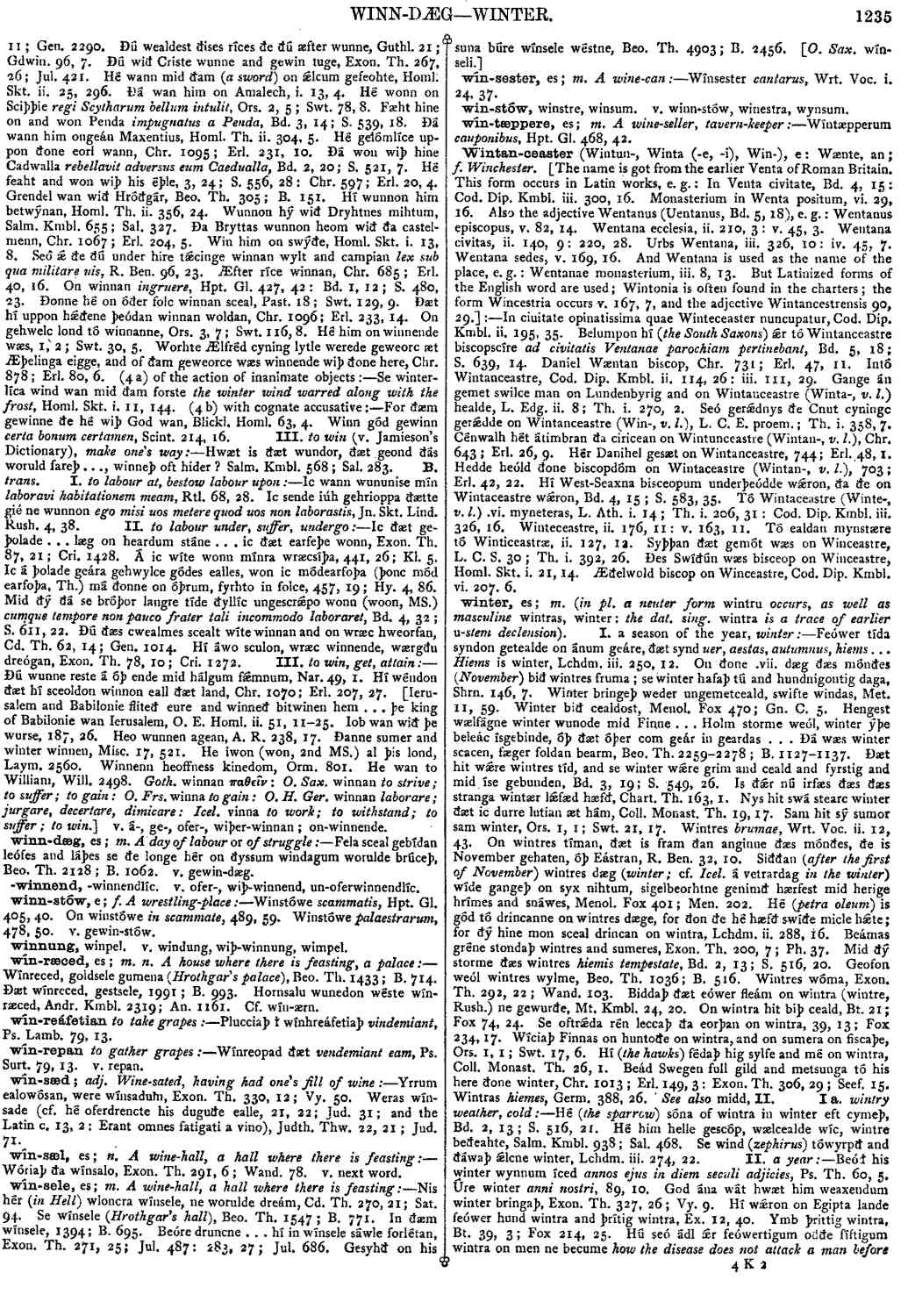Wintan-ceaster (original) (raw)
Winchester. [The name is got from the earlier Venta of Roman Britain. This form occurs in Latin works, e. g. : In Venta civitate,
Bd. 4, 15: Cod. Dip. Kmbl. iii. 300, 16.
Monasterium in Wenta positum, vi. 29, 16. Also the adjective Wentanus (Uentanus, Bd. 5, 18), e. g. : Wentanus episcopus, v. 82, 14. Wentana ecclesia, ii. 210, 3 : v. 45, 3. Wentana civitas, ii. 140, 9: 220, 28. Urbs Wentana, iii. 326, 10: iv. 45, 7. Wentana sedes, v. 169, 16. And Wentana is used as the name of the place, e. g. : Wentanae monasterium, iii. 8, 13. But Latinized forms of the English word are used; Wintonia is often found in the charters; the form Wincestria occurs v. 167, 7, and the adjective Wintancestrensis 90, 29.]
- In ciuitate opinatissima quae Winteceaster nuncupatur,
Cod. Dip. Kmbl. ii. 195, 35. - Belumpon hí (the South Saxons) ǽr tó Wintanceastre biscopscíre
ad civitatis Ventanae parochiam pertinebant
,
Bd. 5, 18; S. 639, 14. - Daniel Wæntan biscop,
Chr. 731; Erl. 47, 11. - Intó Wintanceastre,
Cod. Dip. Kmbl. ii. 114, 26: iii. 111, 29. - Gange án gemet swilce man on Lundenbyrig and on Wintanceastre (Winta-,
v. l.
) healde,
L. Edg. ii. 8; Th. i. 270, 2. - Seó gerǽdnys ðe Cnut cyningc gerǽdde on Wintanceastre (Win-,
v. l.
),
L. C. E. proem. ; Th. i. 358, 7. - Cénwalh hét átimbran ða ciricean on Wintunceastre (Wintan-,
v. l.
),
Chr. 643 ; Erl. 26, 9. - Hér Danihel gesæt on Wintanceastre,
744; Erl. 48, 1. - Hedde heóld ðone biscopdóm on Wintaceastre (Wintan-,
v. l.
),
703; Erl. 42, 22. - Hí West-Seaxna bisceopum underþeódde wǽron, ða ðe on Wintaceastre wǽron,
Bd. 4, 15 ; S. 583, 35. - Tó Wintaceastre (Winte-,
v. l.
) .vi. myneteras,
L. Ath. i. 14 ; Th. i. 206, 31 : Cod. Dip. Kmbl. iii. 326, 16. - Winteceastre, ii. 176, 11: v. 163, 11.
- Tó ealdan mynstære tó Winticeastræ, ii. 127, 12.
- Syþþan ðæt gemót wæs on Winceastre,
L. C. S. 30 ; Th. i. 392, 26. - Ðes Swíðún wæs bisceop on Winceastre,
Homl. Skt. i. 21, 14. - Æðelwold biscop on Winceastre,
Cod. Dip. Kmbl. vi. 207. 6.
Bosworth, Joseph. “Wintan-ceaster.” In An Anglo-Saxon Dictionary Online, edited by Thomas Northcote Toller, Christ Sean, and Ondřej Tichy. Prague: Faculty of Arts, Charles University, 2014. https://bosworthtoller.com/35936.
Checked: 0
